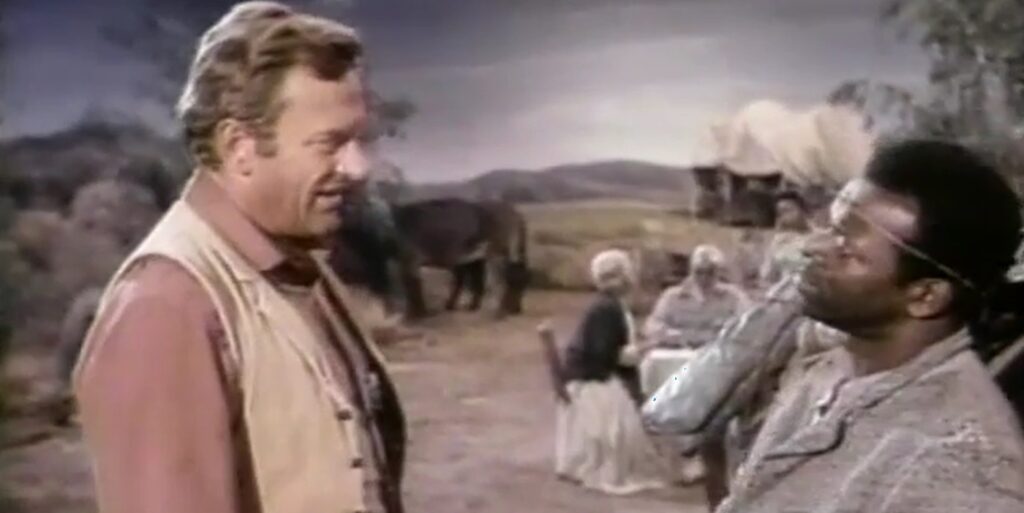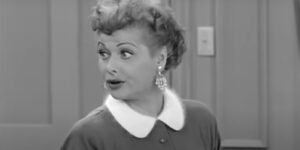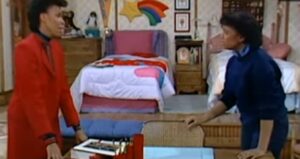
Today, we see how the scarcity of good roles for Black actors led to Gunsmoke getting basically a “who’s who” of Black actors for its first Black-centric episode.
This is “All the Best Things,” a spotlight on the best TV episodes, movies, albums, etc.
This is a Year of Great TV Episodes, where every day this year, we’ll take a look at great TV episodes. Note that I’m not talking about “Very Special Episodes” or episodes built around gimmicks, but just “normal” episodes of TV shows that are notable only because of how good they are.
All this month, I’ll be spotlighting great Black-centric TV episodes.
For many years, the heart of a typical episode of Gunsmoke, the long-running and excellent Western series starring James Arness as Marshal Matt Dillon, was that a guest star would come into conflict with Arness’ Dillon in some way. However, after a number of seasons, the show expanded to an hour. Once the series was an hour long, now the guest stars had to take on even greater prominence in the show, as there was twice as much time to fill. So we’d get greater detail on the situation that the guest stars are involved in beyond their direct involvement with Marshal Dillon.
Arness had been shot in the leg during World War II, which is why Dillon walked with a limp. After 12 seasons or so, Arness’ leg injury became quite arthritic, and so the series cut down on Arness’ involvement on the series. This was achieved in two distinct ways. One, Ken Curtis’ Festus Hagen, Dillon’s deputy marshal, would take the lead role for a number of episodes every season (typically comedic episodes), and two, the show began to lean even MORE on its guest stars, so that the series was almost an anthology series for the last eight seasons or so, with Dillon and the other cast members of the series playing supporting roles to the guest cast.
So that was the setup in Season 14 in 1969, when “The Good Samaritans” aired, where Matt is shot by some bad guys, and is rescued by a group of freed slaves who were traveling to the Oregon Territories to start a new life.
Here’s another interesting thing about this episode. A. It’s kind of sad that it took Gunsmoke FOURTEEN SEASONS before they decided, “Hey, maybe we should finally do an episode about the Black experience in the West?” (which, contrary to how television often depicted it over the years, was actually pretty darn significant. Black cowboys not only existed, they were COMMON back then. I think some estimates say roughly one in FOUR cowboys at the time that Gunsmoke was set, the 1870s, were Black. And yet when they rarely were ever shown on TV, they were typically shown as, like, the cattle drive’s cook or something like that. In any event, at least Gunsmoke finally decided to do an episode on Black characters. It was even beaten to the topic by BONANZA, of all shows) and B. Because of the racism on TV at the time, when a show as big as Gunsmoke wanted to do a Black-centric episode, they basically got their pick of all of the best Black theater actors of the time, so this episode is PACKED with outstanding Black actors, with excellent actors like Lynn Hamilton and Davis Roberts resigned to extremely minor roles as one of the couples in the group.
The central characters in the episode are Juba, the Bible-touting leader of the group, played by the excellent actor, Rex Ingram (one of the few major Black movie stars in the 1940s, but a violation of the Mann Act in 1948 essentially ruined his career. The Mann Act was often used to punish outspoken celebrities, but, well, it was also used by people to actually exploit young women, so, well, Ingram might have been a bad dude for real. He served 10 months in prison). His wife, Mama Olabelle, was played by the brilliant Pauline Myers, a highly respected theater actor who is sadly now best known for being the old lady with the bad eyesight in My Cousin Vinny.
Their daughter, Erlene, was played by Hazel Medina. Brock Peters (who we talked about recently for his spotlight episode of The Loner) played Cato, a really angry guy who had a butchered ear from his time as a slave. Cato has viewed Erlene as sort of his destined future wife. The problem is that the group had met up with Benji (Robert DoQui, best known today for his turn as RoboCop’s sergeant in the three RoboCop movies), who Erlene had fallen in love with, but who had been exiled from the group for stealing a milk cow for the group. He has been trailing behind them, though, and has been surreptitiously meeting with Erlene, and supplying the group with animals that he has killed.
Okay, so there is a bad guy who is locked up in Dodge City. There is a $1500 bounty on his head, but Matt has just procured a statement that will convict the guy in Dodge City. People want the guy released so that they can bring him back to ANOTHER city to stand trial THERE, and collect the $1500 bounty. So the bad guys shoot Matt to try to prevent him from getting the statement back. The group find Matt, and nurse him back to health, and then protect him from the bad guys when they stop by (the bad guys are, of course, super racist jerks, as well) by pretending that Matt is a member of their group dealing with smallpox.
Cato, spurned by Erlene, decides that he will be the hero of the group by trading Matt’s paper for $50 to get the group out of their current predicament (The wheel on their carriage has broken). He, though, not knowing how to read (and too proud to ask Juba to teach him), has grabbed the wrong paper (It was Matt’s letter of introduction from a judge to the sheriff in the other town, telling him to release the statement to Matt). The bad guys then force Cato at gunpoint to get the real paper from Matt. Matt comes up with a plan, and turns the tables on them, but one of the bad guys finds the hidden members of the group (that Matt had told to hide so that he could execute his plan), and Matt is forced to surrender the statement to save the others. Cato is shocked, as he assumed that Matt would have sold them out to protect the paper, so he dives for one of the bad guy’s gun. Matt uses this moment to attack the other guy. The first guy recovers, and is ready to attack when Benji shows up (drawn there by earlier gunfire) and stops the other bad guy.
Benji and Erlene seem set to actually be allowed to be together in the open, and Cato, having redeemed himself, actually volunteers to ride ahead with the statement, correctly noting that no one would ever suspect that he is carrying the statement. Matt thanks him, and agrees to his deal, allowing Cato to have his big moment. It’s all very sweet. Still, took ya long enough, Gunsmoke!
It was written by Paul Savage, the main writer of Gunsmoke in its later years (by “later years,” though, I mean, like, over a decade), and directed by Bernard McEveety, a longtime Gunsmoke director whose brothers were also successful directors (I recently spotlighted an In the Heat of the Night episode directed by Vincent McEveety).
Okay, if I’m going to have 317 more of these (and 9 more this month), I could use suggestions, so feel free to email me at brian@poprefs.com!









